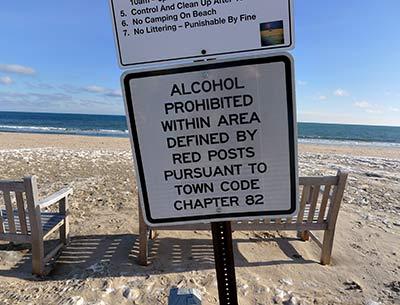Trustees Say Enough

The thermometer still reads sub-freezing at Indian Wells Beach in Amagansett, but a battle between the East Hampton Town Board and the town trustees, who own and manage most of the town’s shorelines and waterways on behalf of the public, is heating up. The issue is a ban on alcohol during lifeguard-protected hours at the beach, which in recent years has seen huge and sometimes rowdy gatherings of young adults.
In July, the town board prohibited drinking during the day there on weekends and holidays. The law took effect on Aug. 2 and expired on Sept. 15. The trustees were strongly opposed to it, but ultimately, and reluctantly, agreed to the temporary measure. However, the sign the town put up, prohibiting alcohol within a defined area, is still there, adding insult to injury, the trustees say. They want it removed, and would like to modify any restrictions enacted this year.
The trustees say that problems at the beach have been resolved by the increased enforcement of existing laws, as they had demanded, and by the new booth on Indian Wells Highway, whose attendants turned away buses and taxis. The statistics suggest they are correct: while the prohibition was in place, said East Hampton Town Police Chief Michael Sarlo, just four summonses were issued relative to the restricted area — 1,000 feet in either direction from the road end — with four more for open containers in the parking lot, between June 1 and Sept. 15.
“Are we open to negotiations at this point?” Diane McNally, the clerk of the trustees, asked her colleagues at the body’s meeting Tuesday. “We’ve been asked to discuss continuing the same plan.” Brian Byrnes, a trustee, said that the entire five-member town board wanted to maintain the restriction through the 2015 season.
Or longer. “The supervisor would like to make it permanent,” Alex Walter, executive assistant to Supervisor Larry Cantwell, said this week. An assessment of the law’s success was difficult, he said, given it did not take effect until August. “I don’t know if it has to be revisited every year,” he said, “but it is the town board’s wish that it be permanent.”
The trustees remain upset, believing that their jurisdiction was usurped. Tim Bock summarized their position on Tuesday. “It wasn’t their jurisdiction,” he said, “and they did it anyway.”
The continued existence of the sign, which makes no mention of when it is and is not in effect, is “rude, a slap in the face, disrespectful,” Ms. McNally said. “That, after all the angst, all the meetings, and it wasn’t reflected on site or in the signage.”
“I don’t think I can trust them again,” said Sean McCaffrey, a trustee. “It was sneaky.”
Ms. McNally indicated that the group may dig its heels in this year, insisting that an alcohol ban extend just 500 feet, not 1,000, in either direction from the road end, and on a time frame matching the beach’s regulations on dogs and vehicles.
The trustees, who are often at odds with the town board and other town agencies over jurisdiction, feel that any ban is an overreaction to a problem that either did not exist or was vastly overstated. Regardless, said Mr. McCaffrey, any infringement on the peaceful enjoyment of the beach in 2014 “was defused quite a bit” by the attended booth and stepped-up enforcement. Mr. Byrnes agreed: “I think the riffraff is gone.”
